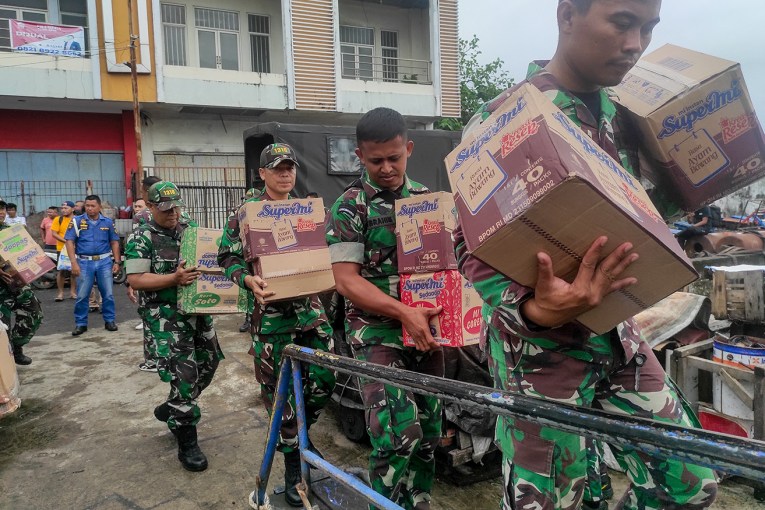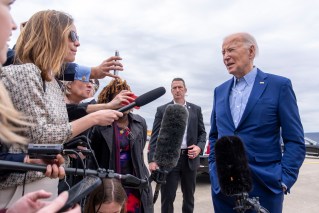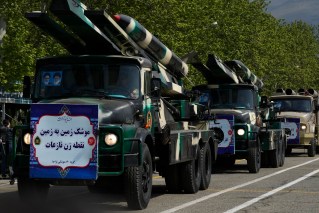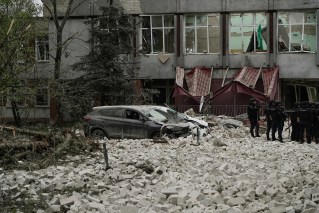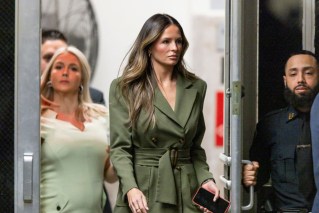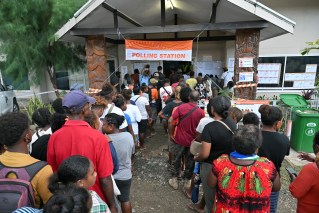Millions of Indonesians head to polls for world’s largest voting day
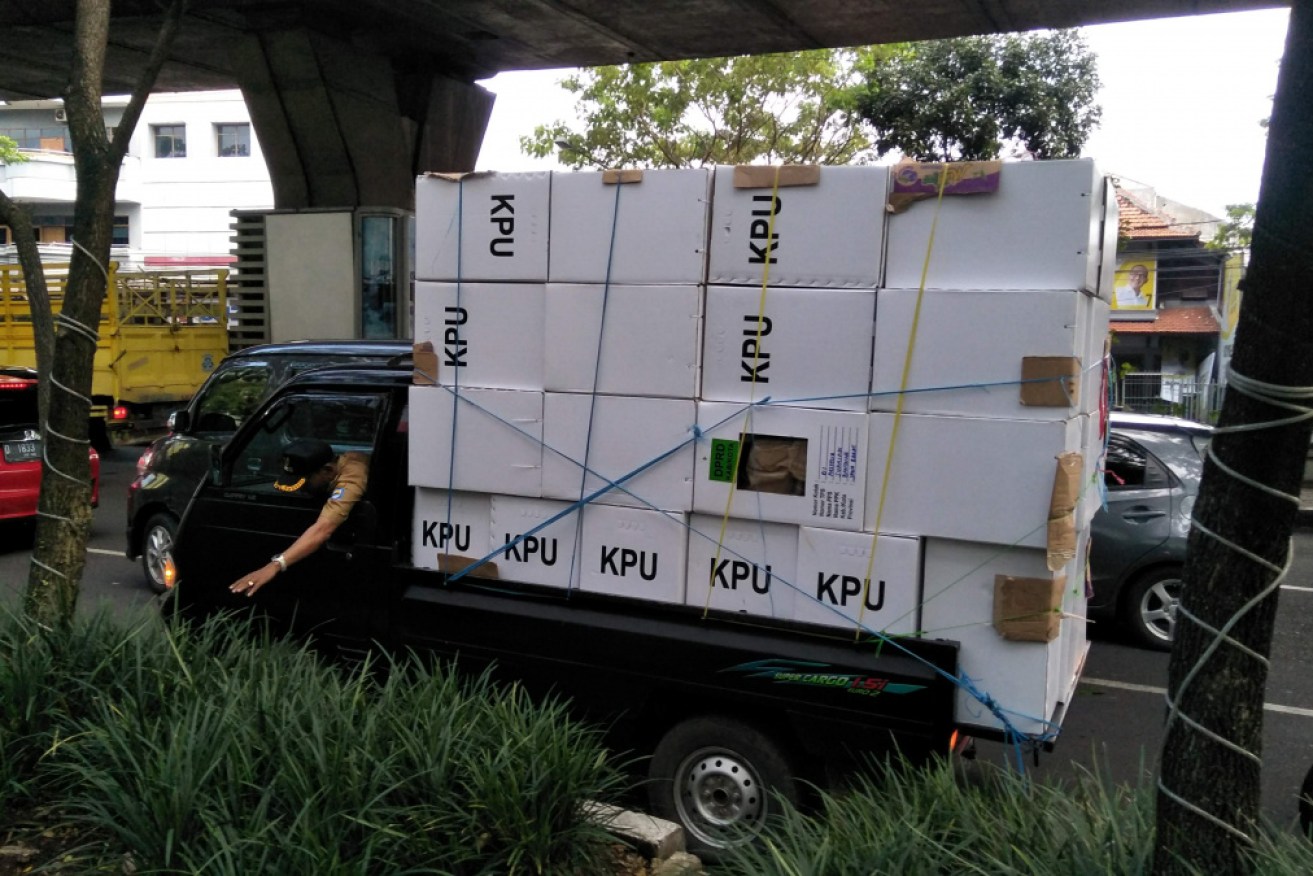
General Elections Commission (KPU) staff delivery ballots around Bandung, Indonesia's third biggest city, before the election. Photo: Gavin Height
Looking at the banners and colourful flags decorating the streets of Bali, Australian tourists would be forgiven for thinking the island was preparing for a major sporting tournament.
Around Indonesia, stadiums have been jam-packed with roaring crowds.
But this is a showdown of far greater significance: The country is undertaking the largest single-day democratic exercise the world has ever seen.
Wednesday marks the much-hyped grand final in what has been largely a battle between two sides.
Vying for the top job of President is incumbent Joko Widodo (commonly known as Jokowi) and Prabowo Subianto, in a rematch of the 2014 election.
But that’s only one seat, albeit the most powerful, out of more than 20,000 being contested. And there is a staggering 245,000 candidates vying for votes, from 16 parties.

President Joko Widodo gives a speech to supporters at a rally at Jakarta’s main stadium on April 13. Photo: Getty
Who could be Indonesia’s next president?
Most of the media coverage has focused on Jokowi and Prabowo, largely ignoring the hundreds of thousands of other candidates.
While Jokowi is tipped to win again, things are a bit different this time.
For one, Jokowi is the incumbent and has been campaigning hard on infrastructure, pointing out the projects his administration has undertaken over the past five years. He also has more campaign resources and more parties in his coalition.
Prabowo is a billionaire businessman who was previously a general under former president and military ruler, Suharto.
Hit with the bill of his 2014 campaign, he has enlisted young, handsome billionaire entrepreneur Sandiago Uno as not only his vice-presidential candidate but also as major campaign financier.
With little state subsidies for political party election campaigning, entering politics is an activity largely reserved for Indonesia’s wealthy elites.
What happens on voting day?
With so many candidates and seats to be decided, the sheer scale of the event is staggering. Across Indonesia’s thousands of inhabited islands, there are 800,000 voting booths. It will take nearly six million staff to count the votes of Indonesia’s 193 million eligible voters, who will be given five different ballots for each of the levels of government being contested.

Sample ballot. Photo: Gavin Height
If you’ve ever balked when confronted with a Senate voting ticket, scratching your head as you try to figure out which party is which, spare a thought for our neighbours.
Indonesia uses proportional voting and open lists in all legislatures.
What this means is that voters are confronted not with five ballot papers but five ballot posters, with upwards of 150 candidates to choose from 16 parties contesting each seat.
And just like having too much choice in the supermarket aisle can lead to rashly grabbing the first cereal within reach in a confused flurry, all this choice is confusing voters.
Speaking with various candidates, they all commented that campaigning not only involves telling voters why they should vote for them, but also – importantly – how to vote for them. With multiple ballots featuring hundreds of names – without photos of candidates – gaining support is only part of the battle for votes.
Some voters aren’t bothered by the confusing ballot papers, with around 30 per cent in the last election choosing not to vote or ‘donkey vote’ – known as ‘golput’ in Indonesian.
This election has seen a rise in a movement to golput – not out of apathy but to send a message to politicians that there are no deserving candidates of the people’s vote.

A golput poster showing both presidential candidates. It reads “Prabowo and Jokowi are the same. They both lie.”
How have candidates courted voters?
Religion was tipped to be a divisive issue, following the corrosive Jakarta Governor elections of 2017 where the incumbent Christian Governor Basuki Tjahaja Purnama (BTP), then known as Ahok, faced a sustained campaign against him by conservative Islamic groups. BTP was defeated and imprisoned on trumped-up blasphemy charges.
Observers were concerned of a repeat of the divisiveness of that election. Such concerns are widely believed to be the reason Jokowi picked influential conservative cleric Ma’ruf Amin as his vice-presidential candidate, as Jokowi also faces criticism that he is ‘not Muslim enough’.
Prabowo, himself not overly religious, has courted these conservative Islamic groups and tried to harness their supporter bases.

Sign calling on voters to turn out. The finger dipped in ink signifies a person has voted, preventing voting again. Photo: Gavin Height
And while religion has by no means been absent from the campaign, it hasn’t played the role many feared.
While the two candidates have engaged religion, they come from nationalist parties and have campaigned heavily on economic issues.
Like Australians, Indonesians share concerns about cost of living, education, health, jobs and economic management. It’s hoped a newly signed free trade deal between the two countries could facilitate more interaction with Australia and help Indonesians pursue business and education opportunities.
Australians have more in common with their neighbours than they think – but misconceptions persist.
A poll conducted by Australia’s Department of Foreign Affairs and Trade showed that more than half of respondents didn’t even know Indonesia was a democracy. That Indonesia will undertake the world’s largest single-day elections, absent of widespread tampering and conjecture is cause for celebration.
Possibly not with a democracy sausage, but with a democracy satay stick instead.
Gavin Height is a researcher from La Trobe University, currently based in Indonesia
